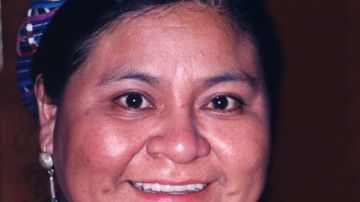11 Indigenous Latina Heroines You Should Know
Yesterday was Columbus Day, a national federal holiday (October 8), which is meant to celebrate Christopher Columbus’s “discovery” of America on October 12, 1492

Photo: Wikimedia/RIGOBERTA MENCHU
Yesterday was Columbus Day, a national federal holiday (October 8), which is meant to celebrate Christopher Columbus’s “discovery” of America on October 12, 1492. Instead of cosigning on a lie, and the blatant disrespect of the indigenous community, here at HipLatina we prefer to celebrate Indigenous People’s Day instead.
Columbus Day might have been yesterday, but we shouldn’t just rely on one day to celebrate and educate about America’s indigenous communities. Let’s take a moment to highlight the strong women who were a part of stirring change. The following 11 indigenous Latinas (chosen to offer a representation of various Latin American countries), are heroines you should know about.
wp_*posts
Bartolina Sisa
Aymara Bertolina Sisa is considered an indigenous heroine. The Bolivia native, along with husband Tupac Katari, and sister-in-law Gregoria Apaza, rose up against the Spanish in 1781. Sisa was executed on September 5, 1872; September 5 is now considered International Indigenous Women’s Day, in her honor.
wp_*posts
Rigoberta Menchú Tum
Happy birthday to Rigoberta Menchú Tum!
Rigoberta Menchú Tum actively works for the rights of indigenous peoples and reconciliation between ethnic groups. In her Nobel Lecture she spoke about her work: https://t.co/D2b1jWpHAV pic.twitter.com/dzSitzbXDr
— The Nobel Prize (@NobelPrize) January 9, 2019
K’iche’ (Quiche) Rigoberta Menchu Tum has fought for both indigenous and indigenous women’s rights, in Guatemala. She received the Nobel Peace Prize in 1992, and ran for president of Guatemala in 2007 and 2011.
wp_*posts
Miriam Miranda
Garifuna Miriam Miranda has stood up for the cultural and environmental/land rights of the Garifuna community in Honduras. She is the leader/General Coordinator of the Black Fraternal Organization of Honduras (OFRANEH).
wp_*posts
Berta Caceres
Lenca Berta Caceres Flores was an indigenous leader, who fought for environmental/land rights of the Lenca people in Honduras. She co-founded the Council of Popular and Indigenous Organizations of Honduras (COPINH), and was awarded the Goldman Environmental Prize in 2015. Caceres became a martyr when she was murdered in 2016.
wp_*posts
Milagro Sala
Indigenous Argentinian Milagro Sala is a political and social activist, who founded the Tupac Amaru neighborhood association, joined the Argentine Workers’ Central Union (CTA), and has worked with the Association of State Workers of Jujuy (ATE). On January 16, 2016, Sala was arrested and imprisoned for alleged fraud, extortion, sedition, inciting violence, and illicit association, a move meant to silence her (she was convicted on protest-related charges in 2017). The United Nations, Amnesty International, and the Inter-American Court of Human Rights have requested her release. wp_*posts
Dolores Cacuango (Mamá Doloreyuk, Mama Dulu)
https://www.instagram.com/p/BgEZX46lAX5/?tagged=dolorescacuango
Dolores Cacuango (Mamá Doloreyuk, Mama Dulu) fought for indigenous rights, feminism, and farm/land rights in Ecuador during the 1940s. She founded the first bilingual Kichwa (Quichua)-Spanish school in the country, and founded the Indigenous Federation of Ecuador (FEI) in 1944.
wp_*posts
Comandanta Ramona
Comandanta Ramona was an officer of the Zapatista Army of National Liberation (EZLN) in Mexico. She helped found the National Indigenous Congress, after going to Mexico City for the National Indigenous Forum in October 1996. Ramona also was one of the Zapatista women to draft The Revolutionary Women’s Law/Revolutionary Law on Women, in January of 1994.
wp_*posts
Tarcila Rivera Zea
Quechan Tarcila Rivera Zea is a Peruvian indigenous activist. She founded CHIRAPAQ (Center for Indigenous Cultures) in 1985, and was elected to the UN Permanent Forum on Indigenous Issues, for 2017-2019.
wp_*posts
Silvia Carrera
https://www.instagram.com/p/BgjW197g3Zy/?tagged=silviacarrera
Silvia Carrera Concepción is the General Cacique (indigenous group leader) of the Ngäbe-Buglé Comarca (the largest indigenous comarca/region) in Panama. She is the first female cacique of the Ngöbe, and has fought for indigenous rights, including fighting against copper mining and a hydroelectric dam on their land.
wp_*posts
Moira Millán
Mapuche Moira Millan is a social activist, feminist, and leader of the Pillán Mahuiza community in Chubut (Puelmapu), Argentina. She is known as a weichafe, or warrior/defender.
wp_*posts
Nina Pacari
Nina Pacari (born Maria Estela Vega Conejo) is Kichwa (Quichua) indigenous leader, lawyer, and politician in Ecuador. She is the first indigenous woman elected to Ecuadorian parliament (in 1997), became it’s first indigenous vice president in 1998, and in 2007, was elected to the country’s Supreme Court.

















